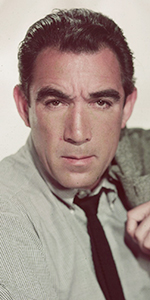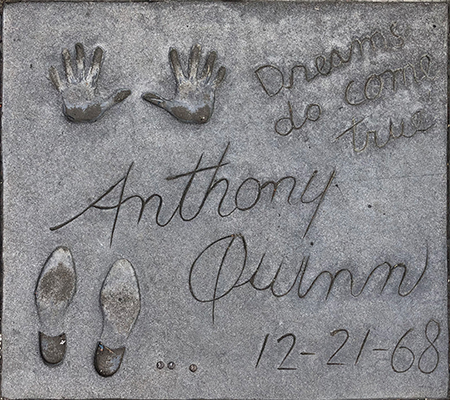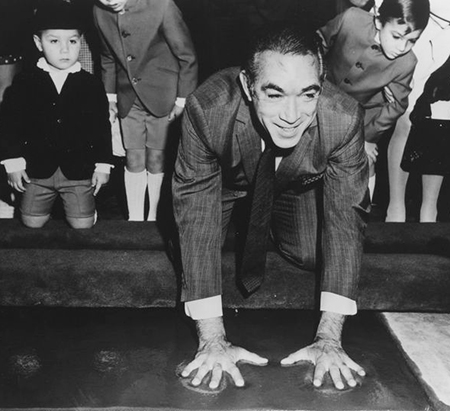 |
 |
 |
 |
 |
| Anthony Quinn. Date unknown. |
| |
|
 |
|
 |
| |
 |
| |
 |
| |
 |
| |
 |
| |
|
|
| Anthony Quinn |
 |
| Forecourt Ceremony held on Monday, December 21, 1968 |
| |
Born: Antonio Rodolfo Quinn Oaxaca, April 21, 1915, in Chihuahua, Mexico
Age at the time of the ceremony: 53
Died:
June 3, 2001, in Boston, Massachusetts, age 86
|
| |
Anthony Quinn was Hollywood's first true "ethnic" star. Appearing in supporting roles in the 1930s, Quinn headlined in big-budget films after winning the Best Supporting Actor Oscar — twice. He made an awful lotta great films.
Quinn was born to an Irish father and a Mexican mother; when six years old, he was introduced to Catholicism, but veered toward the Foursquare Gospel Church, eventually playing in a touring band and sharing the stage with church founder Aimee Semple McPherson. Growing up kicking around both El Paso Texas and Boyle Heights in Los Angeles, Quinn dropped out of high school to become a boxer. Switching gears, he went to study architecture with Frank Lloyd Wright.
But Quinn was drawn to the stage. Wright encouraged him to follow his destiny. Arriving in Hollywood, Quinn got a gig on the Paramount lot as an extra on
the Harold Lloyd comedy The Milky Way (released in February 1936). While there, he caught the attention of director Cecil B. DeMille, who put Quinn in his stock company, playing all sorts of "exotics." He played a Cheyenne in The Plainsman (released in November 1936), with Gary Cooper, played a pirate henchman to Fredric March's Jean Lefite in The Buccaneer (released in February 1938), and was in Brian Donlevy's gang of baddies in Union Pacific (released in May 1939). He married the boss' daughter Katherine in 1937. They had five children together.
Despite this, Quinn was dropped from the DeMille orbit, spending his time in "B" pictures like Island of Lost Men (released in August 1939), and playing the not-very heavy in Road to Singapore (released in March 1940), with Bing Crosby and Bob Hope, and also Blood and Sand (which played the Chinese in May 1941). Quinn got a fairly big part as Chief Crazy Horse in They Died with Their Boots On (released in November 1941), with Errol Flynn, and played a scheming bank robber in the comedy Larceny, Inc. (released in May 1942), with Edgar G. Robinson.
While Quinn's presence in Road to Morocco (released in November 1942), with Crosby and Hope is fairly big, he was still in the background or in ensembles, such as: The Black Swan (which played the Chinese in November 1942), with Tyrone Power, The Ox-Bow Incident (played the Chinese in June 1943), Guadalcanal Diary (played the Chinese in November 1943) and Buffalo Bill (played the Chinese in April 1944).
Things began to change for Quinn with his co-starring with John Wayne in the war film Back to Bataan (released in May 1945). When Marlon Brando took a vacation from the Broadway production of A Streetcar Named Desire, Anthony Quinn was his replacement. He teamed with his other replacement, Uta Hagen, taking Streetcar on tour around the country, finally playing the Great White Way in May 1950, but it only ran for a couple weeks. Director Elia Kazan must have liked him; after doing a bullfighting movie The Brave Bulls (released in April 1951, where he played second-fiddle to Mel Ferrer) Kazan put him in his next film with Marlon Brando: Viva Zapata! (played the Chinese in March 1952); Quinn got the Best Supporting Actor Oscar for his work in this film.
Although Quinn was still playing pirates in
Against All Flags (released in December 1952), he captured the hearts of film-goers around the world with his first signature role in Italian director Federico Fellini's masterwork, La Strada (premiered in September 1954 at the Venice Film Festival). Remaining in Italy, he played Antinous to Kirk Douglas' Ulysses (released in October 1954) and The Magnificent Matador (released in May 1955). Quinn then played Gaspar de Portola in Seven Cities of Gold (released in September 1955).
Quinn co-starred as painter Paul Gauguin to Kirk Douglas'
Vincente Van Gogh in Lust for Life (released in September 1956), a role which won him his second Best Supporting Actor Oscar. Gina Lollobrigida would receive top-billing over Quinn who had the title role in the Italian version of The Hunchback of Notre Dame (released in December 1956).
Quinn directed The Buccaneer (released in December 1958) for DeMille with Yul Brynner and Charlton Heston, but the result was not a happy one. He kept very busy regardless, appearing in Wild is the Wind (released in December 1957), Last Train from Gun Hill (released in July 1959), Heller in Pink Tights (released in January 1960), and The Savage Innocents (released in February 1961).
Quinn had a great (though still supporting) role in
The Guns of Navarone (released in April 1960), then went to Broadway to star as King Henry II, in Becket with Laurence Olivier in the title role, for 193 perfs starting in October 1960. He left the show to star (finally) in Barabbas (released in December 1961).
Growing older and heavier, Quinn returned to boxing in
Requiem for a Heavyweight (released in October 1962), then played Howeitat shaikh Auda Abu Tayi in director David Lean's masterpiece, Lawrence of Arabia (released in December 1962), with Peter O'Toole in the title role. He accepted the title role in Alexis Zorbas - Zorba the Greek (released in December 1964), which became a world-wide smash hit, paving the way for Quinn to star as a reluctant Pope in The Shoes of the Fisherman (released in November 1968). Director Stanley Kramer had him lead The Secret of Santa Vittorio (released in October 1969), while director Carol Reed had him play a Native American troublemaker in Flap (released in November 1970).
Universal put Quinn in a television cop show The Man and the City for 15 episodes aired over ABC from September 1971 to Janaury 1972. He published his autobiography, The Original Sin: A Self-Portrait in October 1972. He then played a Mafia don in The Don Is Dead (released in November 1973), and portrayed Aristotelis Onassis in The Greek Tycoon (released in May 1978).
Quinn starred in a revival of the Kander & Ebb musical version of Zorba on Broadway for 362 perfs from October 1983 to September 1984. Always finding something to do in Italy, he starred as Long John Silver in a television movie, L'isola del tesoro - Treasure Island in Outer Space aired over RAI, in November 1987, then appeared in the notoriously awful Ghosts Can't Do It (released in October 1989), with Bo Derek.
Quinn starred in a retelling of
The Old Man and the Sea aired over NBC in March 1990. He has a minor role in Jungle Fever (premiered in May 1991 at the Cannes Film Festival),
and plays a mobster in Last Action Hero (released in June 1993).
Beginning with Hercules and the Amazon Women, aired over NBC in April 1994, he played Zues in four more Hercules television movies. Quinn played host in a television game show / reality TV / hybrid, La noche de los castillos for eight episodes over La 1 in September 1995). Another Quinn autobiography, One Man Tango, was published in 1995.
Retiring (sort of) to Bristol Rhode Island, Quinn died of complications from throat cancer in June 2001, at the age of 86.
Quinn's final film was released posthumously, Avenging Angelo (released in August 2002 in Italy, straight to video in May 2003 in the US), with Slyvester Stallone. |
|
|
|
|
| |
 |
 |
| Grauman's Chinese Theatre, Hollywood, California. Anthony Quinn Forecourt block. Executed by John Tartaglia, Monday, December 21, 1968. 45 x 40 inches. |
 |
 |
 |
| Grauman's Chinese Theatre, Hollywood, California. Anthony Quinn Forecourt ceremony, Monday, December 21, 1968. Mr. Quinn's chidren, Lorenzo (left), Danny (with most of head cut off), and Francesco (right) look on as dad places his hands in the cement. |
|
 |
| |
 |
| |
|